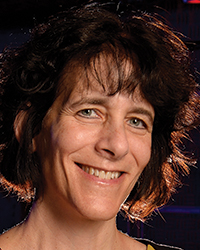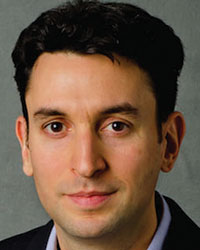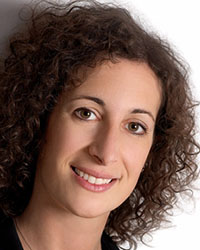Cattell Fund Projects Include Explorations of Sensory Processes, Memory
The 2018–2019 James McKeen Cattell Fund Fellowships have been awarded to APS Fellows Cynthia F. Moss and Seth D. Pollak, Steven Franconeri, and R. Shayna Rosenbaum. Presented in partnership with APS, the fellowships allow recipients to extend their sabbatical periods from one semester to a full year. The four researchers plan to pursue diverse research projects, outlined below, during their sabbaticals.

Cynthia F. Moss
Cynthia F. Moss
Johns Hopkins University
For more than 30 years, I have pursued research in experimental psychology with an emphasis on the biological basis of behavior. As an undergraduate and graduate student, I conducted experiments on sensory processing in subjects ranging from blowflies to humans to frogs and cats. An early focus of my research was spatial vision in mammals, and for my dissertation, I studied auditory specializations in frogs. As a postdoc, I continued to pursue my interests in sensory processing and spatial perception, but chose an animal model that relies on hearing to guide its behavior: the echolocating bat. The bat produces ultrasonic vocalizations and uses information contained in echo returns to build a three-dimensional representation of the world. This animal has served as the cornerstone of my research, as its active sensing system offers an exceptional tool to directly measure the sensory signals that inform spatially guided behaviors. It is my broad goal to apply data from studies of the echolocating bat to identify general principles of sensory processing, sensorimotor integration, spatial perception, attention, and memory.
For my sabbatical, I plan to revisit my early research interests in spatial vision and work with collaborators at the Hong Kong University of Science and Technology to bridge studies of active sensing through echolocation and vision. One of my proposed sabbatical projects will involve computational modeling of active sensing with engineering faculty member Bertram Shi. Specifically, we will develop a modeling framework to investigate the sensorimotor feedback system that supports spatial representation through active sensing by echolocation. We will also extend this work to identify general principles of sensorimotor feedback processes that are integral to spatially guided behaviors in other species. In another project, I plan to conduct experiments on the neural basis of prey capture in larval zebrafish with neurobiology faculty member Julie Semmelhack. We will combine quantitative behavioral analyses, two-photon imaging, and optical manipulations of neural activity to map circuits for visually guided prey capture. We also will carry out computational modeling of visually guided prey capture in zebra fish that incorporates knowledge of active sensing obtained from other organisms, including bats. These empirical and computational modeling studies will inform and inspire new directions in my research on sensorimotor feedback and spatially guided behaviors in freely behaving animals.

Seth D. Pollak
Seth D. Pollak
University of Wisconsin-Madison
I plan to use my sabbatical year to extend my research program on children’s emotional development. One project will focus on development of new empirical paradigms to address problems that psychological scientists have had measuring children’s subjective emotional experience in the laboratory. To do so, I will integrate contemporary knowledge about the interface of emotion and the brain with humanist perspectives. While we are now learning a tremendous amount about the physiology, genetics, and hormonal factors that contribute to emotions, it is difficult to integrate these laboratory-based studies with people’s everyday emotional experiences. My goal is to complement many of the techniques I have developed to study how children perceive, recognize, and regulate emotions with humanistic perspectives on subjective experience. Artists and architects use sensory methods to inspire reflection and affect; writers and composers select linguistic and musical triggers to elicit emotional reactions. Increasingly, computer scientists and engineers are seeking to integrate these kinds of devices to advance emotion research as well. My hope is that these types of cross-disciplinary links can foster development of new kinds of laboratory paradigms.
Additionally, with my second project I will attempt to forge a new perspective on understanding children’s emotional development through the lenses of machine learning and contemporary learning theory. I will re-examine the sensitivity and specificity of emotion cues (e.g., facial movements, auditory signals, body postures, subjective experiences) with a focus on children’s learning. How might new perspectives in learning inform our understanding of the ways children can use cues in their social environments to make predictions about other people’s behaviors? I hope this line of work will generate hypotheses about specific developmental mechanisms that account for the changes we observe in human emotion with increasing maturity and social experience.

Steven Franconeri
Steven Franconeri
Northwestern University
During my Cattell Fellowship, I plan to write a book that synthesizes three research literatures: visual cognition, graph comprehension, and data visualization. These research communities often study similar questions and utilize highly complementary expertise and styles of inquiry, yet they too rarely interact. I will serve as an ambassador among these fields by abstracting over jargon, motivating methodologies, and explaining models from one field to the others.
My background is in visual cognition. For the past 20 years, I have studied the power and limits of the visual system as people monitor, memorize, track, or count sets of objects, and have sought mechanistic explanations for the roots of those visual processing limits. Over the past 10 years, this work has increasingly benefitted from cross-pollination by new research literatures, including graph comprehension and data visualization. The majority of our lab’s current work is on the perceptual underpinnings of data visualization, and I serve as a papers cochair for a major information visualization conference. These interdisciplinary connections inspire our basic research in psychology. When we attempt to address real-world problems from other fields, we find that we fail more often than we succeed. That allows us the perspective of seeing what our current theories cannot answer, so that we can ask new basic research questions to find out why.

R. Shayna Rosenbaum
R. Shayna Rosenbaum
York University
My research program takes a multimethod approach of combining cognitive, patient-lesion, eye tracking, and neuroimaging methods to investigate the role of the hippocampus in episodic and spatial memory, and how these forms of memory relate to one another and to nonmnemonic abilities such as future decision-making. This work presents major challenges to classic theories of hippocampal function, which do not distinguish between different forms of declarative memory and do not view a role for the hippocampus that extends beyond memory. The Cattell Fund Fellowship will allow me to engage in interdisciplinary and international collaborations to examine two interrelated questions:
1. What are the roles of the hippocampus and neocortex in episodic and spatial memory?
2. To what extent is episodic memory needed for decision-making?
To address the first question, we are continuing to develop a novel software suite to produce first-person simulations of real-world spatial environments and to track eye movements and moment-by-moment involvement of different brain regions when a route is novel versus familiar or when changes to routes are introduced. This research takes an interdisciplinary approach with collaborators in the Vision: Science to Applications (VISTA) program at York University and at the Rotman Research Institute at Baycrest. The second question will be addressed with interdisciplinary tasks from behavioral economics in patients with episodic memory impairment. Together with international collaborators at Washington University in St. Louis and at the University of Bologna, we will assess the ability to decide advantageously about monetary rewards while cuing individuals to imagine specific events or to reflect on the intensity of their feelings associated with receiving the reward. Findings will be used to devise tools to detect and remediate areas of deficit in the patients.
For more than half a century, the James McKeen Cattell Fund has provided support for the science and the application of psychology. The deadline for applications for the 2019-2020 awards is January 15, 2019. Applications and letters of recommendation must be submitted via the online portal. To learn more, click here.




APS regularly opens certain online articles for discussion on our website. Effective February 2021, you must be a logged-in APS member to post comments. By posting a comment, you agree to our Community Guidelines and the display of your profile information, including your name and affiliation. Any opinions, findings, conclusions, or recommendations present in article comments are those of the writers and do not necessarily reflect the views of APS or the article’s author. For more information, please see our Community Guidelines.
Please login with your APS account to comment.